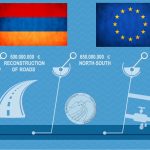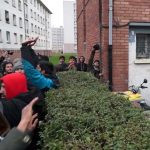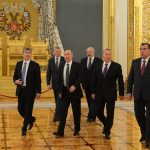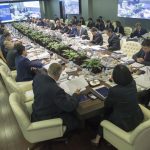- 15 April, 2022
- Foreign Policy
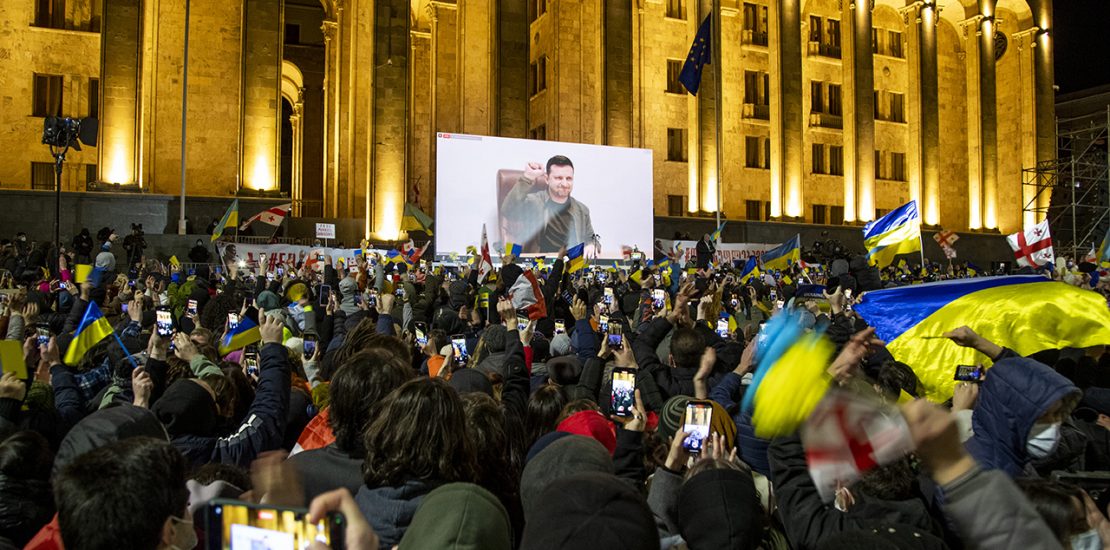
Since the start of hostilities in Ukraine by the Russian Federation on February 24, the Georgian authorities have made a number of problematic statements and actions against official Kiev, contrary to Tbilisi’s anti-Russian rhetoric and stance that was in place for years.
The Union of Informed Citizens has decided to refer to the position and actions of the Georgian authorities in this hot phase of the Russian-Ukrainian conflict, which have led to the deterioration of relations with Kiev.
First official reactions, crowded rallies
On the morning of February 24, in its first reactions to the Russian armed forces launching hostilities in Ukraine, the Georgian side supported Kiev against Moscow. The first statements in support of Ukraine were made by the highest authorities of the country, the President and the Speaker of the Parliament, followed by a post by Prime Minister Irakli Garibashvili on his Twitter microblog, in which he stated that they stand by Ukraine.
“We are with Ukraine. A military attack on a sovereign country is unacceptable. We call on the international community to take all possible actions to stop Russia’s blatant violation of international order and to avoid further military escalation,” Garibashvili wrote.
Since February 24, crowded rallies and protests in support of Ukraine and against Russia have been held in many cities around the world, as well as in the central squares and streets of Tbilisi. During one of the rallies, even the President of Ukraine Vladimir Zelensky addressed the thousands of Georgians who took to the streets with a video message.
Tbilisi’s actions forced Kiev to recall its ambassador
The day after the hostilities started in Ukraine, on February 25, the ruling Georgian Dream faction thwarted the opposition’s initiative to convene an extraordinary parliamentary session on Ukraine․ Chairman of the Parliament Shalva Papuashvili reasoned that the opposition’s demand to hold a special session is not to support Ukraine, but to manipulate those events for domestic political purposes. Later, the ruling majority rejected the initiative of the opposition to organize another speech of the President of Ukraine in the Georgian parliament, arguing that it is not within the competence of the parliamentary opposition.
These incidents were followed by the scandalous statement of the country’s leader Gharibashvili, which revealed the real position of official Tbilisi in the current stage of the Russian-Ukrainian conflict. The Georgian Prime Minister noted that his country is not going to join the economic sanctions against Russia.
“Georgia is not going to join financial and economic sanctions, as it will only harm our country and our citizens further. Therefore, as the head of the government responsible for the people of the country, I will be guided only by the national interests of the country,” Garibashvili said.
This statement was followed by a tweet from Ukrainian President Zelensky, in which he thanked the Georgian public for its support and hinted at the unprincipledness of the Georgian government.
“Incredible Georgian people who understand that friends should be supported. ․․․ Indeed, there are cases when the citizens are not government, but they are better than the government,” Zelensky wrote on his Twitter page.
Later, the Georgian authorities banned a detachment of about 60 Georgian volunteers from leaving for Ukraine to take part in hostilities. This incident further aggravated the tension between Tbilisi and Kiev, and the President of Ukraine recalled Ukraine’s ambassador to Georgia.
Kiev did not lose sight of the agreement reached between Tbilisi and Moscow on lifting the ban on the export of Georgian dairy products to Russia during the hostilities. Considering this step unacceptable, official Kiev reminded Tbilisi about the Russian invasion of Georgia in 2008.
“Cooperation with Russian companies gives Russia additional resources to continue the brutal war against Ukraine. Georgia is well aware of the horror of the war that the Ukrainians are now going through. It seems that the Georgian government has forgotten 2008 and is now trying to use the moment for its own interests,” the statement said.
The scandals in the tense Georgian-Ukrainian relations during the hostilities were not limited to these events. On April 4, the Central Intelligence Agency of the Ministry of Defense of Ukraine accused the Georgian government of covertly supporting Russia and not interfering in smuggling incidents.
“Due to the imposition of international sanctions, the Russian Federation has lost the opportunity to supply a wide range of military, dual-use and civilian goods. In order to avoid sanctions, Russian agents are creating smuggling routes, which, in particular, pass through the territory of Georgia. Meanwhile, the Georgian government has instructed special services not to interfere in the activities of smugglers,” the statement said.
The Georgian side immediately denied the allegations․ The Ministry of Finance, the National Security Service, and the Ministry of Foreign Affairs issued statements demanding that Ukraine provide concrete evidence. The Prime Minister described the allegation as absurd, claiming that Georgia “will never allow its territory to be used for transporting sanctioned goods”.
South Ossetia’s desire to join Russia and Georgia’s neutrality
On March 30, against the background of hostilities in Ukraine, the President of the unrecognized Republic of South Ossetia Anatoly Bibilov announced that the country will take legal steps in the near future to join the Russian Federation. Russia recognized the independence of South Ossetia after the short Russian-Georgian war of 2008.
The Georgian Foreign Ministry also responded to the news of a referendum in South Ossetia on joining Russia, calling it unacceptable.
“Of course, the talk of holding a referendum is unacceptable in the conditions when the territory of Georgia is occupied. “This occupation has not only a political, but also a legal assessment,” said Davit Zalkaliani, who was still Foreign Minister at the time.
Georgian experts view South Ossetia’s initiative to join Russia as a “threat” and “pressure” from Moscow on Georgia, which obliges the country to at least remain neutral on the Russian-Ukrainian conflict and Western military-political integration projects. In this regard, the statement of the Georgian leader on the need to maintain peace and stability in the country and not to open a second front was remarkable.
“There will be no second front in Georgia (against Russia), and the government will continue to protect the state and its citizens,” Garibashvili said.
The controversy between the president and the executive over the war
The Russian-Ukrainian war has sparked controversy between President Salome Zurabishvili and the legislature and the executive. Zurabishvili criticized the country’s parliamentarians and executive authorities for not properly supporting Ukraine.
Tensions between the president and other institutions peaked after Zurabishvili presented her annual report to parliament on March 14. In that speech, Zurabishvili said that Georgian society is “much more sober, conscious, courageous and, most importantly, united” than the legislators, adding that Georgia “has stood and stands by Ukraine and the Ukrainians”.
On the same day, the board of the ruling Georgian Dream party decided that the government would go to the Constitutional Court, arguing that the president is violating the constitution, so they decided to “introduce Zurabishvili to the functions and powers of the constitutional bodies”.
It is noteworthy that the Georgian government did not approve of Zurabishvili’s European visits on the agenda of the war in Ukraine. The Prime Minister Garibashvili stated that the latter is in a delusion, adding that “when the region finds itself in such a difficult situation, the President of Georgia, the Supreme Commander-in-Chief, should be in the country”.
Nane Manasyan

